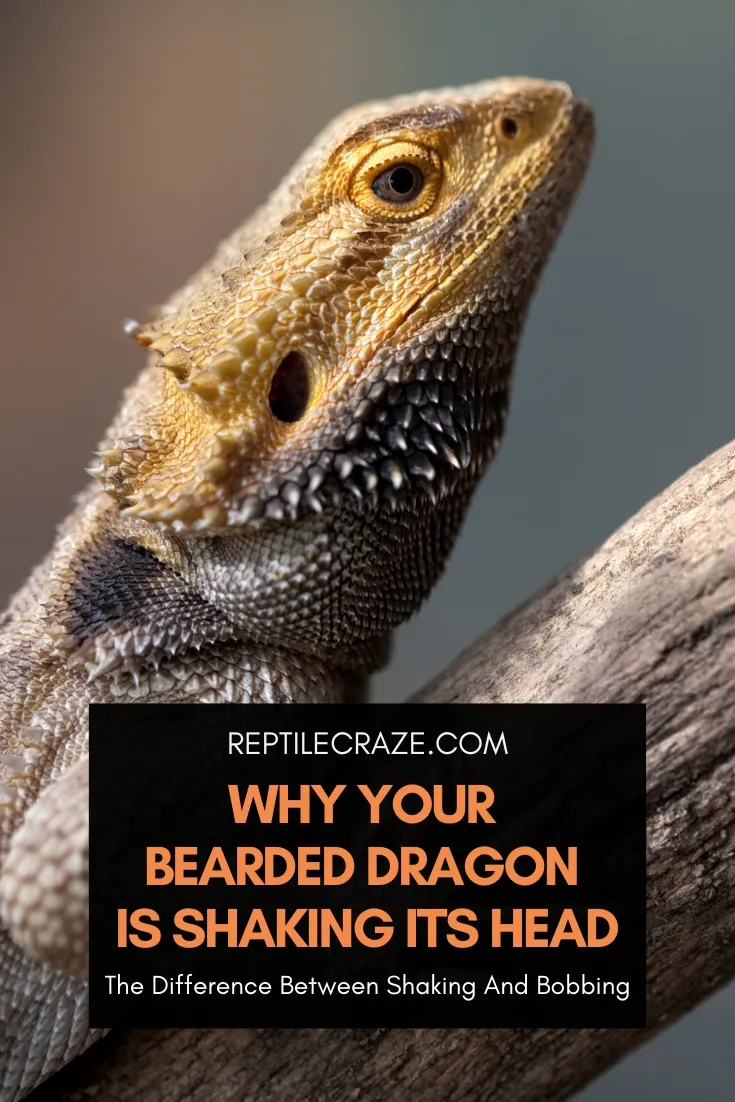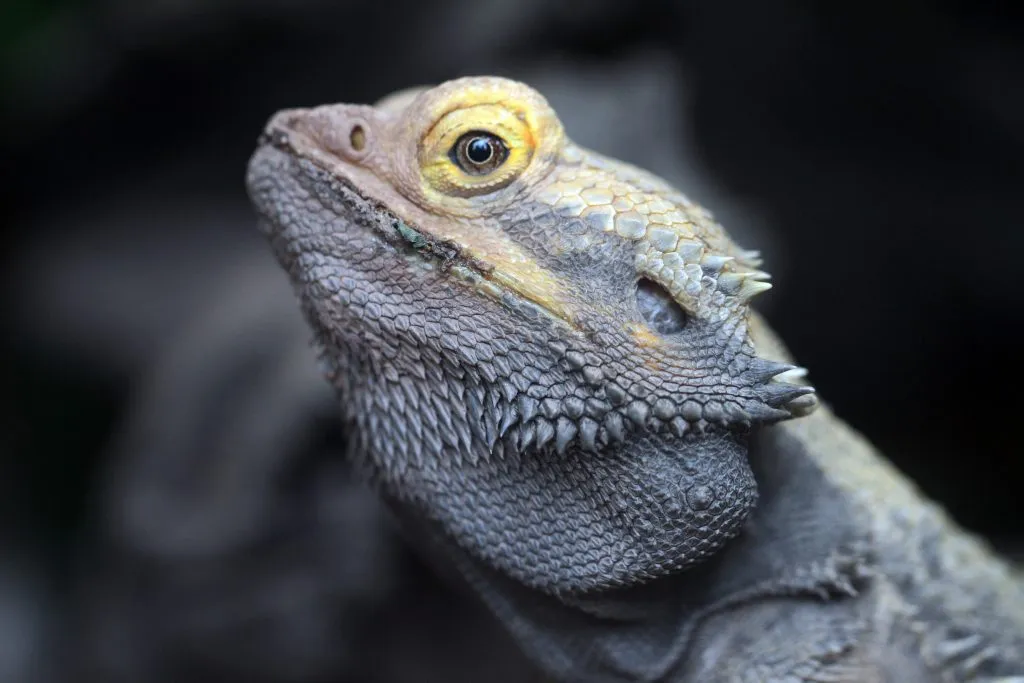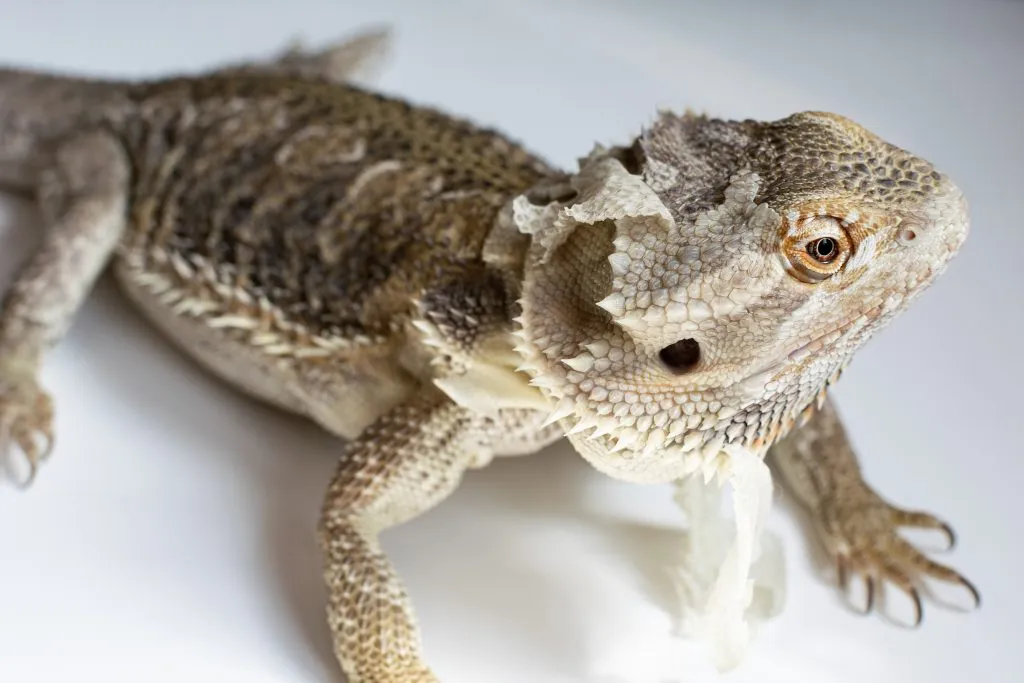
Why is your bearded dragon shaking its head? Is this normal behavior or a sign to go to the vet? We often see bearded dragons bobbing their head, but is this the same as shaking their heads? What should you do when your bearded dragon shakes its head violently?
Bearded dragons shake their heads due to dominant behavior, calcium deficiency, neurological issues, mating response, respiratory infection, and stress. Usually, head shaking is associated with dominance, however, if the behavior is habitual it may be a cause for concern.
We will talk about the possible reasons your bearded dragon is shaking its head. Additionally, we will give you tips on how to correct the behavior if the reason is not a cause for medical intervention. So read on!
Table of Contents
Reasons Why Your Bearded Dragon Is Shaking Its Head
It is vital to determine that your bearded dragon is actually shaking its head as opposed to head bobbing or shaking its body. When we say that your beardie is shaking its head, the movement is mostly characterized by side-to-side motions and up-and-down motions.
This can be easily confused with head bobbing. So you can check out this article to make sure that your beardie is bobbing its head.
On the other hand, if the shaking does not stem from the head but rather from the body, this article will help a lot.
1. Bearded Dragon Is Displaying Dominant Behavior
Bearded dragons are territorial reptiles. In the wild, they will mark their territories and fight other bearded dragons that encroach on their territory. They also fight for mates as well as
Even in captivity, they also display this behavior especially if they are still not used to their environment and your presence. If this is the case, you may notice your beardie bobbing and shaking its head when you go near its enclosure.
The same goes if you have other pets or reptiles that approach their enclosure. Further, if there are other beardies around, they will also exhibit this behavior to assert dominance.
This is also the reason why it is not a good idea to house two bearded dragons in one enclosure. It is possible to do so for breeding’s sake, but permanently doing so may cause harm to both bearded dragons.
Tip: You can discourage this dominant behavior of your bearded dragon towards you by letting it to get used to your presence and later on doing handling training. As you build a bond, you will notice that the head shaking will be minimal and eventually it will stop.
2. Bearded Dragon Has Calcium Deficiency
This is usually the first reason that comes to mind when your bearded dragon is shaking its head.
This is why a lot of owners panic when they see their beardies behaving like rock stars during a concert when in reality there are still other normal explanations behind the behavior.
So before you panic, answer the following questions:
- Are you dusting the
food of your bearded dragon with calcium powder based on its feeding schedule? - Is your UVB light working properly?
- Is the heat of the
tank maintained based on heating requirements? - Is the basking spot still receiving the highest UVB output?
If you check your setup and measure the outputs of said devices, and your answer to all of the questions is “yes,” then it is possible that your beardie does not have a calcium deficiency or metabolic bone disease.

However, if there are some questions in which you answered, “no,” then there is a chance that your beardie is suffering from calcium deficiency.
It may be due to forgetting to add calcium powder for one to two weeks or you added the powder on the feedings days that do not require such.
It is also possible that your UVB light is no longer emitting the right UVB output or that the heat inside the enclosure dropped which paved the way for your beardie’s inability to absorb the calcium in its system.
If this is the case, then you should consult your vet for proper medical treatment. If detected early, there is a large chance of complete recovery.
Pro Tip: Check the UVB output of your UVB light once a month to know if the output is still accurate. The UVB output naturally decreases with constant use. You can use a digital radiometer like this one. We use it all the time.
3. Bearded Dragon Has A Neurological Issue
There is still not a lot of research regarding neurological issues of bearded dragons, but current studies suggest that most of them stem from previous illnesses of parents that are then passed around in the genetic pool.
The most common illness that is associated with this neurological issue is Adenoviral infection. In this study, it was found that even healthy bearded dragons suffer from neurological issues brought about by the genes of their affected parents.
The affected genes are not simply transferred from the parent to the baby bearded dragon, but it significantly affects the entire bloodline.
This does not mean that your bearded dragon will die, it simply means that it will display symptoms of a neurological issue.
With proper care and support from the vet, it is still possible for a bearded dragon with a neurological issue to live a long life.
Head shaking in bearded dragons can be a sign of seizures, as seen in the video below. In this case, you will see that the bearded dragon is shaking its head violently.
4. Bearded Dragon Mating Response
If you are planning to breed bearded dragons, then it is normal to see this head-shaking behavior. Usually, the male does large head bobs when approaching the female to establish dominance. It can also slightly shake its head.
On the other hand, female bearded dragons shake their heads when a male is around in order to show submission. Alternatively, they will not shake their heads but rather bob their heads when they do not want to submit to the male.
Why Is My Bearded Dragon Shaking Its Head Side To Side?
We discussed earlier that head shaking can be a combination of up and down and side-to-side motions. There are also cases when head shaking is just comprised of side-to-side motions.
The side-to-side shaking of the head can also be attributed to the following reasons:
Stress
If you just got your bearded dragon and placed it in its new enclosure, then it is not yet well adjusted to its surroundings and your presence.
It may just stay in one place and shake its head, not because there is something wrong with it, but because it is anxious about the things around him.
Your bearded dragon may also shake its head due to stress when you have not yet bonded with it and you try to clean the enclosure or refill its water bowl. The same goes when your dog or cat (if you have any) goes near the enclosure.
Tip: You can cover a part of the enclosure with a cloth when your bearded dragons gets easily stressed. This can help calm it and minimize the head shaking.
Shedding
It is also possible that your bearded dragon is shaking its head as it is about to shed or is currently shedding. Bearded dragons shake their heads in order to loosen the skin on their beards and around their heads to have a full shed.

Why Is My Baby Bearded Dragon Shaking Its Head?
Baby bearded dragons usually shake their heads if they are experiencing nutritional issues. Given that you have had your baby bearded dragon for a while, and it suddenly exhibited this behavior, then you have to adjust the contents of its
It is vital for a growing baby bearded dragon to have a varied diet of vegetables, fruits, and feeder insects. If you just stick with one
On the other hand, if you just got a baby bearded dragon and it started to shake its head, it may be attributed to stress.
You have to give your baby beardie some time alone in order to adjust to its new home. Once, it is settled, the head shaking should go away in a couple of weeks.
Why Is My Bearded Dragon Shaking Its Head While Coughing?
If your bearded dragon is shaking its head while coughing, then it is likely that it has a respiratory infection.
It may be shaking its head as it is uncomfortable and wants to be rid of the mucus on its nostrils and discharge in its eyes.
At the same time, it may also be shaking its head as it is finding it hard to breathe normally. It is also a sign of respiratory infection when they are shaking their head while keeping their mouth open.
It is best to visit your vet if your beardie has a respiratory infection so that they can properly diagnose it and also give antibiotics and other treatments.
If you are not sure if it is a coughing sound that you hear from your beardie, you can check this article to know more about the sounds that bearded dragons make.
Final Thoughts
You have to closely monitor your bearded dragon when it starts to shake its head. At the same time, you also have to know when it is shaking or bobbing or if it is the body that is shaking.
It is only then that you can determine the reason behind the behavior. Always keep the tank clean and the lighting and heating requirements maintained. Be diligent with your feeding schedule and do not stress your bearded dragon.
When you do all of this, the head shaking will eventually go away. Expect to get happy head bobs from your beardie!
- Enchi Ball Python: A Unique and Stunning Morph of Python regius - March 27, 2025
- Emerald Tree Monitor: The Enigmatic Green Guardian of the Rainforest - March 26, 2025
- The Egyptian Cobra (Naja haje): A Fascinating Serpent - March 25, 2025
